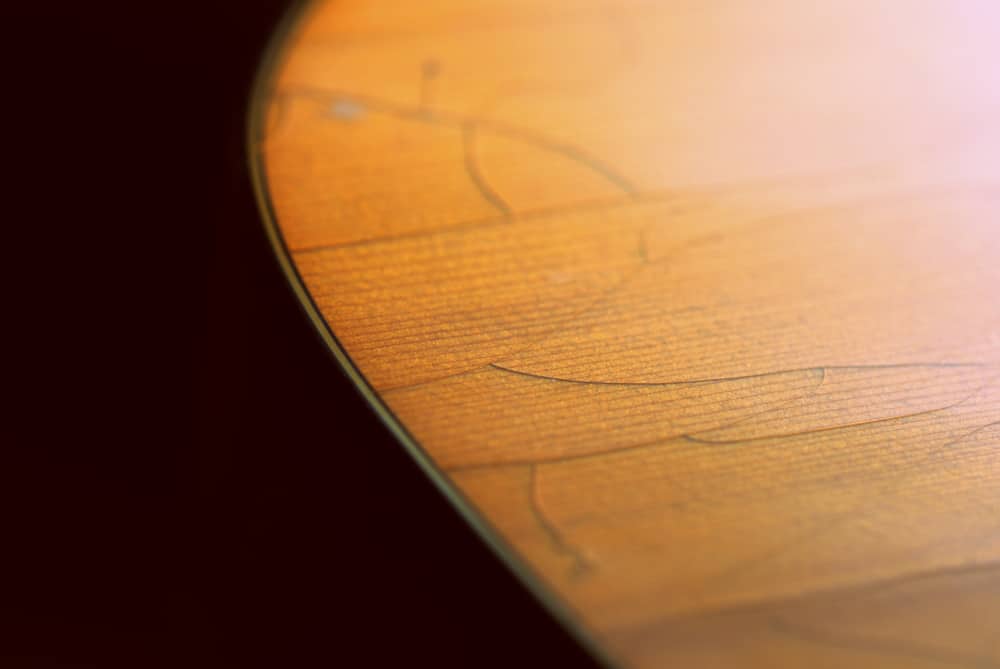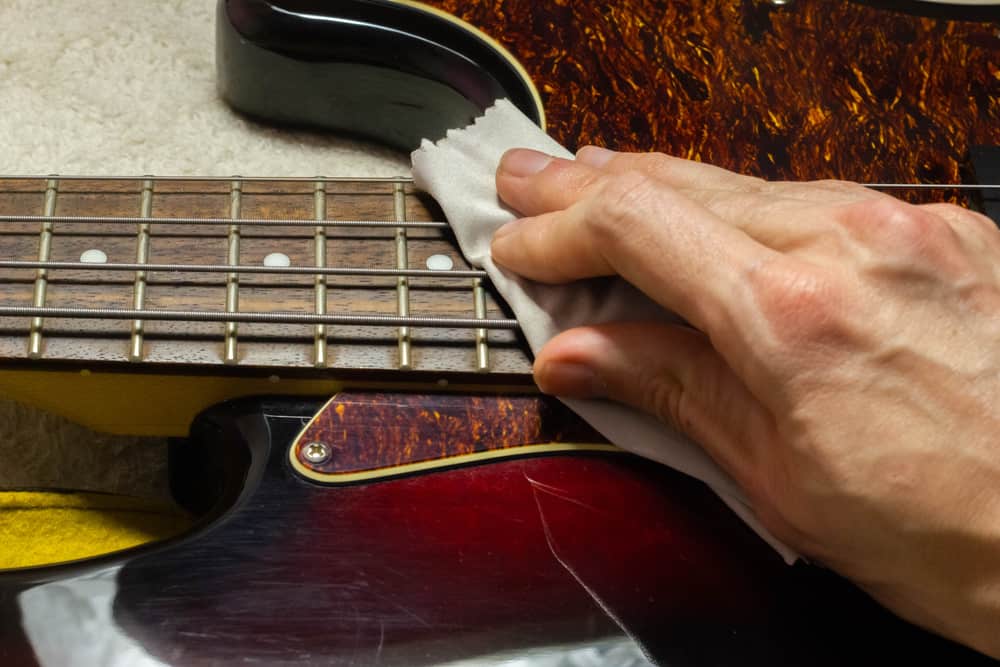Guitars and fretboards get dirty, there is no way around it. Many new guitar players don’t know the proper care and maintenance of playing guitar and wonder if water is a suitable option for cleaning their fretboard. Let’s discuss it.
You can clean your fretboard with water, but it is not not recommended. Water can substantially damage and deteriorate wood over time. Dampening a cloth and cleaning only around the frets is also not advised. If you have any all-purpose household cleaner, we recommend using that over water.
This article will detail the ins and outs of water, wood, and your fretboard. It will explain why you shouldn’t really clean your fretboard with water and its reasoning, considering wood in general and the specific types of wood your fretboard is made of. Lastly, we’ll discuss how to clean your fretboard correctly if you intend to do so with water.
Is It Safe To Clean A Fretboard With Water?
You can clean a fretboard with water, but there are certain precautions your should take if you do want to attempt to do this. However, it is important to keep in mind that water will harm the long-term preservation of your guitar and there are far better solutions out there.
First, let’s discuss what water does to wood to better understand what it can do to your fretboard.
What Does Water Do To Wood?

Water degrades and rots wood. It weakens the wood (in this case, the fretboard), causes it to bow, and can even in some cases cause mold to grow on it. If you don’t think that this is possible, you can think of homes made from wood. In some cases, when there is too much water that seeps into the wood of the home (due to various conditions), then water damage to the home can occur. Moreover, it can get so bad that the wood in the house has to be replaced.
The same is true for a guitar. It will help if you remember that a guitar is only made from wood and then whatever metal alloy the manufacturers decide to use for the other parts.
You may think that a fretboard is treated, but it is not in most instances. Only the body of the guitar, the neck (sometimes), and other specific parts are treated to prevent water build-up or damage.
What Type Of Wood Is A Fretboard Made From?
Take into consideration that only maple fretboards are polymer-coated. This means that they are already treated and that you don’t have to treat the wood yourself for it to age properly. The polymer coating protects the fretboard against water and the elements. Maple fretboards are significantly more resistant to water than other guitars, however, we still do not recommend using water to clean them as the coating wears down over time and this will allow water to seep into the wood.
Rosewood is the most common wood used for fretboards, especially on expensive guitars. Because guitars last for years and years, many players treat the fretboard with a specific oil and clean it with a particular wood cleaner or guitar cleaner. This is done so that the wood can age and cure properly over time.
Another fretboard wood that is not so common but is also used on costly guitars is ebony. Typically a very bright wood, this wood is also untreated. Guitar players should also treat this wood with a particular wood oil or guitar oil to age well. This goes for cleaning ebony fretboards as well.
How Should You Clean A Fretboard With Water?
If you plan to clean a fretboard with water and you have no other choice, you should take steps to ensure that you do not damage the wood. Let’s discuss what you should not do first and then how you can properly clean it.
What Not To Do With Fretboards And Water
First, you should never clean your fretboard constantly with water. As we discussed, water seepage over time into the wood will deteriorate it. If you intend to clean it with water, make sure you only ever do it sparingly when you don’t have any better options around.
If you play so much that you have to keep cleaning it every time you change strings, our best advice is to get some guitar cleaner and wood oil.
The next element to consider is never pour water onto your fretboard. You should only use water sparingly by dampening a cloth with some.
How to clean your fretboard with water

Now that we know what not to do, we can go over how you can (if necessary) clean your fretboard with water.
As we said, you should dampen a cloth rather than pour water over it. Avoid using a dirty cloth as this can introduce additional contaminants to the fretboard.
Focus on cleaning the parts around the frets. If you do this, you should clean about 70% of the wood on the fretboard. Moreover, most of the dirt and grime usually builds up around the frets (the steel alloy pieces separating the fretboard).
If you need to wipe down the actual frets, we suggest rubbing small patches of the dirty fretboard and doing so with small circular motions to get it clean. Try not to rub the fretboard up and down each fret to get it clean.
What Substitute For Water Can I Use For My Fretboard?
It would be more beneficial to use a typical all-purpose household cleaning spray and clean your fretboard with that instead of water if you have no option. Most homes have these types of cleaning products, and it would be better to use them.
The principal in cleaning your fretboard would be the same. You should spray the cleaning product on a rag rather than directly onto the wood, and you should go about cleaning mainly the sections around the actual frets and not the entire fretboard.
One of the best options, in our opinion, is to use lemon oil. Stay away from straight lemon juice, in fact, there are leon oils made specifically to clean guitar fretboards and we would recommend using one of these.
Conclusion
We conclude that although you can use water to clean your fretboard, you should avoid it in most cases, and it is pretty simple to do so. Even a typical all-purpose household cleaner will work better than water. However, if water is the only cleaning source available, we suggested using it sparingly and dampening a cloth with it.
Remember that your fretboard is wood that needs to age properly over time and should be cleaned correctly and treated every so often if you can.
